Investigating Vegetarianism and its Role in Reducing Cancer Risk
VerifiedAdded on 2024/05/30
|8
|1522
|174
Report
AI Summary
This research proposal investigates the potential link between vegetarianism and the reduction of cancer risk. It begins by establishing the global significance of cancer as a leading cause of mortality and morbidity, highlighting the need for effective prevention strategies. The proposal outlines the research question focusing on the association between vegetarianism and reduced cancer risk, with the aim of determining if such a link exists. The research objectives include exploring cancer prevalence worldwide, assessing the impact of non-vegetarian diets on cancer risk, identifying a potential correlation between vegetarianism and reduced cancer risk, and recommending dietary approaches for cancer risk reduction through vegetarianism. The study employs a descriptive research design, utilizing secondary data collected through a systematic literature review from credible databases. Data analysis will be conducted using thematic analysis to identify key themes related to the research question and objectives, while adhering to ethical considerations and data protection guidelines. The proposal concludes with a detailed timeline for the research activities.
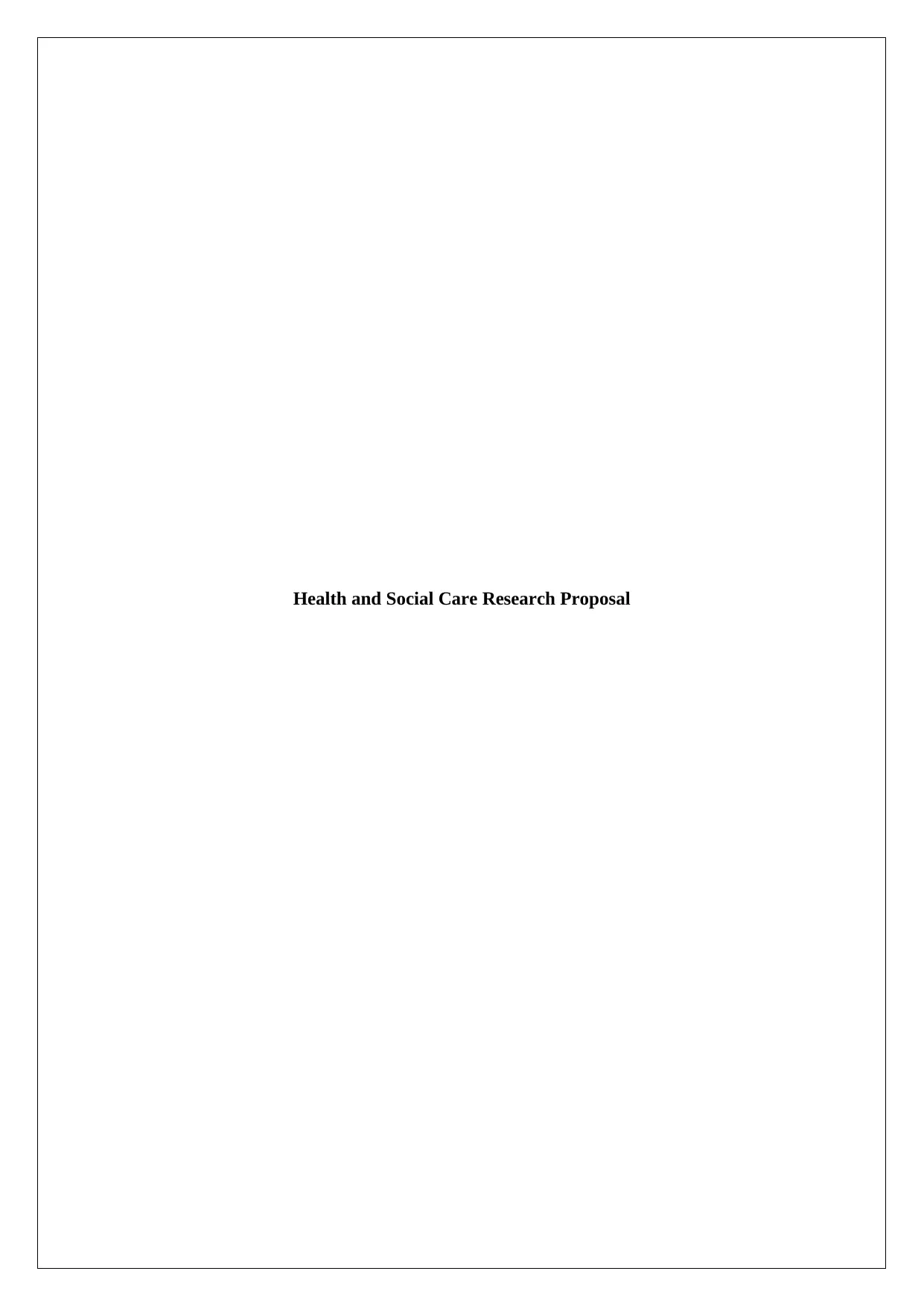
Health and Social Care Research Proposal
Paraphrase This Document
Need a fresh take? Get an instant paraphrase of this document with our AI Paraphraser
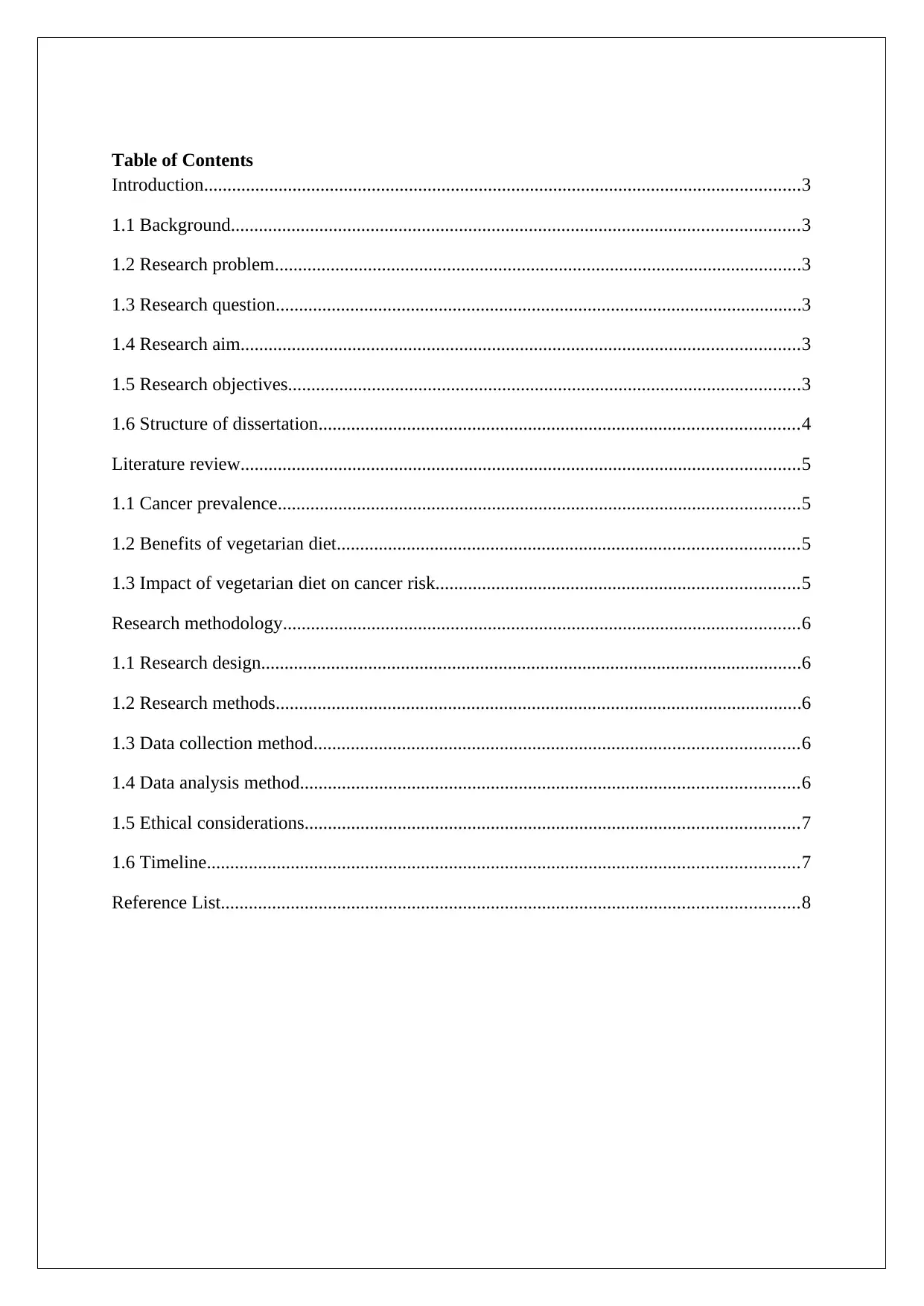
Table of Contents
Introduction................................................................................................................................3
1.1 Background..........................................................................................................................3
1.2 Research problem.................................................................................................................3
1.3 Research question.................................................................................................................3
1.4 Research aim........................................................................................................................3
1.5 Research objectives..............................................................................................................3
1.6 Structure of dissertation.......................................................................................................4
Literature review........................................................................................................................5
1.1 Cancer prevalence................................................................................................................5
1.2 Benefits of vegetarian diet...................................................................................................5
1.3 Impact of vegetarian diet on cancer risk..............................................................................5
Research methodology...............................................................................................................6
1.1 Research design....................................................................................................................6
1.2 Research methods.................................................................................................................6
1.3 Data collection method........................................................................................................6
1.4 Data analysis method...........................................................................................................6
1.5 Ethical considerations..........................................................................................................7
1.6 Timeline...............................................................................................................................7
Reference List............................................................................................................................8
Introduction................................................................................................................................3
1.1 Background..........................................................................................................................3
1.2 Research problem.................................................................................................................3
1.3 Research question.................................................................................................................3
1.4 Research aim........................................................................................................................3
1.5 Research objectives..............................................................................................................3
1.6 Structure of dissertation.......................................................................................................4
Literature review........................................................................................................................5
1.1 Cancer prevalence................................................................................................................5
1.2 Benefits of vegetarian diet...................................................................................................5
1.3 Impact of vegetarian diet on cancer risk..............................................................................5
Research methodology...............................................................................................................6
1.1 Research design....................................................................................................................6
1.2 Research methods.................................................................................................................6
1.3 Data collection method........................................................................................................6
1.4 Data analysis method...........................................................................................................6
1.5 Ethical considerations..........................................................................................................7
1.6 Timeline...............................................................................................................................7
Reference List............................................................................................................................8
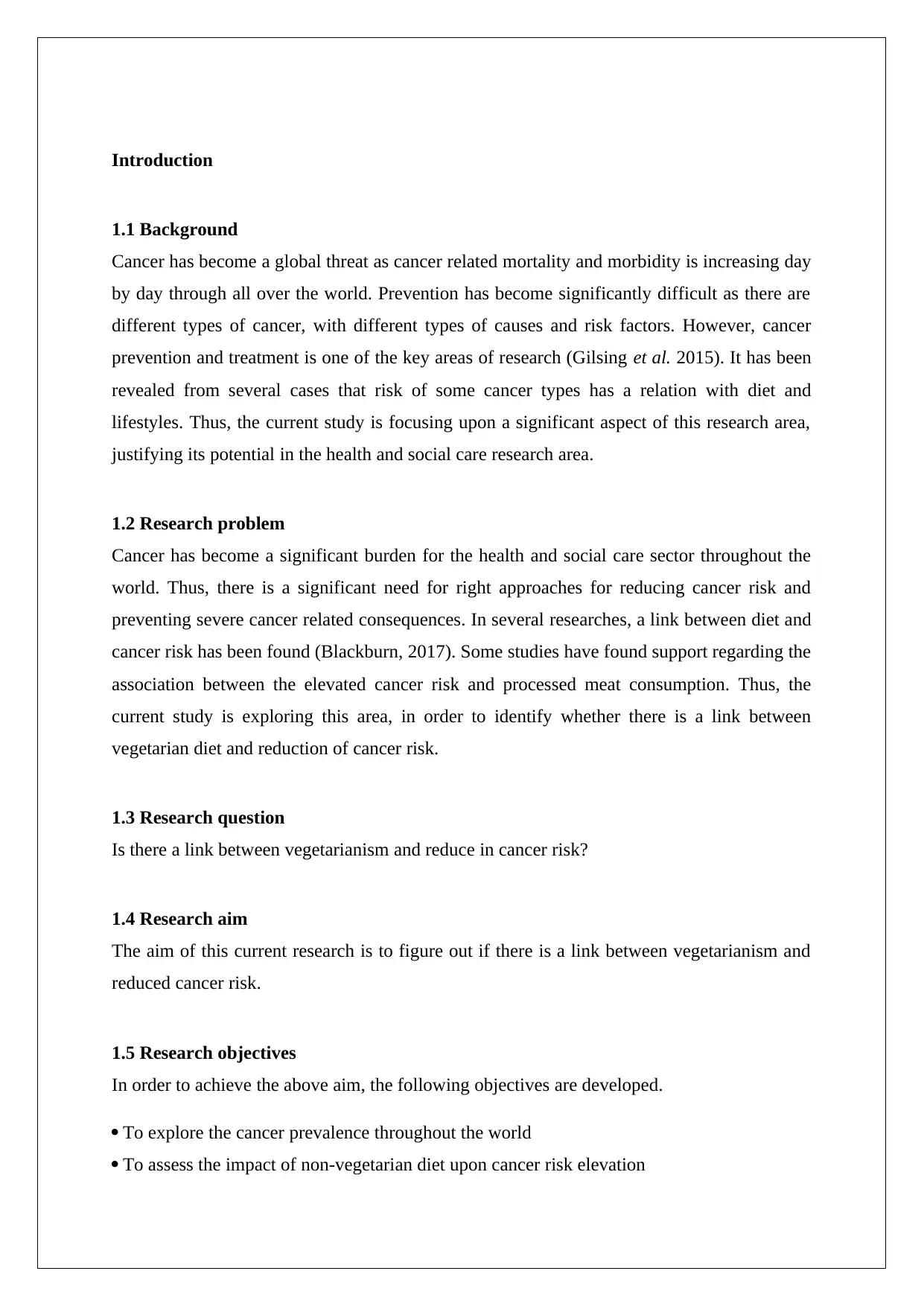
Introduction
1.1 Background
Cancer has become a global threat as cancer related mortality and morbidity is increasing day
by day through all over the world. Prevention has become significantly difficult as there are
different types of cancer, with different types of causes and risk factors. However, cancer
prevention and treatment is one of the key areas of research (Gilsing et al. 2015). It has been
revealed from several cases that risk of some cancer types has a relation with diet and
lifestyles. Thus, the current study is focusing upon a significant aspect of this research area,
justifying its potential in the health and social care research area.
1.2 Research problem
Cancer has become a significant burden for the health and social care sector throughout the
world. Thus, there is a significant need for right approaches for reducing cancer risk and
preventing severe cancer related consequences. In several researches, a link between diet and
cancer risk has been found (Blackburn, 2017). Some studies have found support regarding the
association between the elevated cancer risk and processed meat consumption. Thus, the
current study is exploring this area, in order to identify whether there is a link between
vegetarian diet and reduction of cancer risk.
1.3 Research question
Is there a link between vegetarianism and reduce in cancer risk?
1.4 Research aim
The aim of this current research is to figure out if there is a link between vegetarianism and
reduced cancer risk.
1.5 Research objectives
In order to achieve the above aim, the following objectives are developed.
To explore the cancer prevalence throughout the world
To assess the impact of non-vegetarian diet upon cancer risk elevation
1.1 Background
Cancer has become a global threat as cancer related mortality and morbidity is increasing day
by day through all over the world. Prevention has become significantly difficult as there are
different types of cancer, with different types of causes and risk factors. However, cancer
prevention and treatment is one of the key areas of research (Gilsing et al. 2015). It has been
revealed from several cases that risk of some cancer types has a relation with diet and
lifestyles. Thus, the current study is focusing upon a significant aspect of this research area,
justifying its potential in the health and social care research area.
1.2 Research problem
Cancer has become a significant burden for the health and social care sector throughout the
world. Thus, there is a significant need for right approaches for reducing cancer risk and
preventing severe cancer related consequences. In several researches, a link between diet and
cancer risk has been found (Blackburn, 2017). Some studies have found support regarding the
association between the elevated cancer risk and processed meat consumption. Thus, the
current study is exploring this area, in order to identify whether there is a link between
vegetarian diet and reduction of cancer risk.
1.3 Research question
Is there a link between vegetarianism and reduce in cancer risk?
1.4 Research aim
The aim of this current research is to figure out if there is a link between vegetarianism and
reduced cancer risk.
1.5 Research objectives
In order to achieve the above aim, the following objectives are developed.
To explore the cancer prevalence throughout the world
To assess the impact of non-vegetarian diet upon cancer risk elevation
⊘ This is a preview!⊘
Do you want full access?
Subscribe today to unlock all pages.

Trusted by 1+ million students worldwide
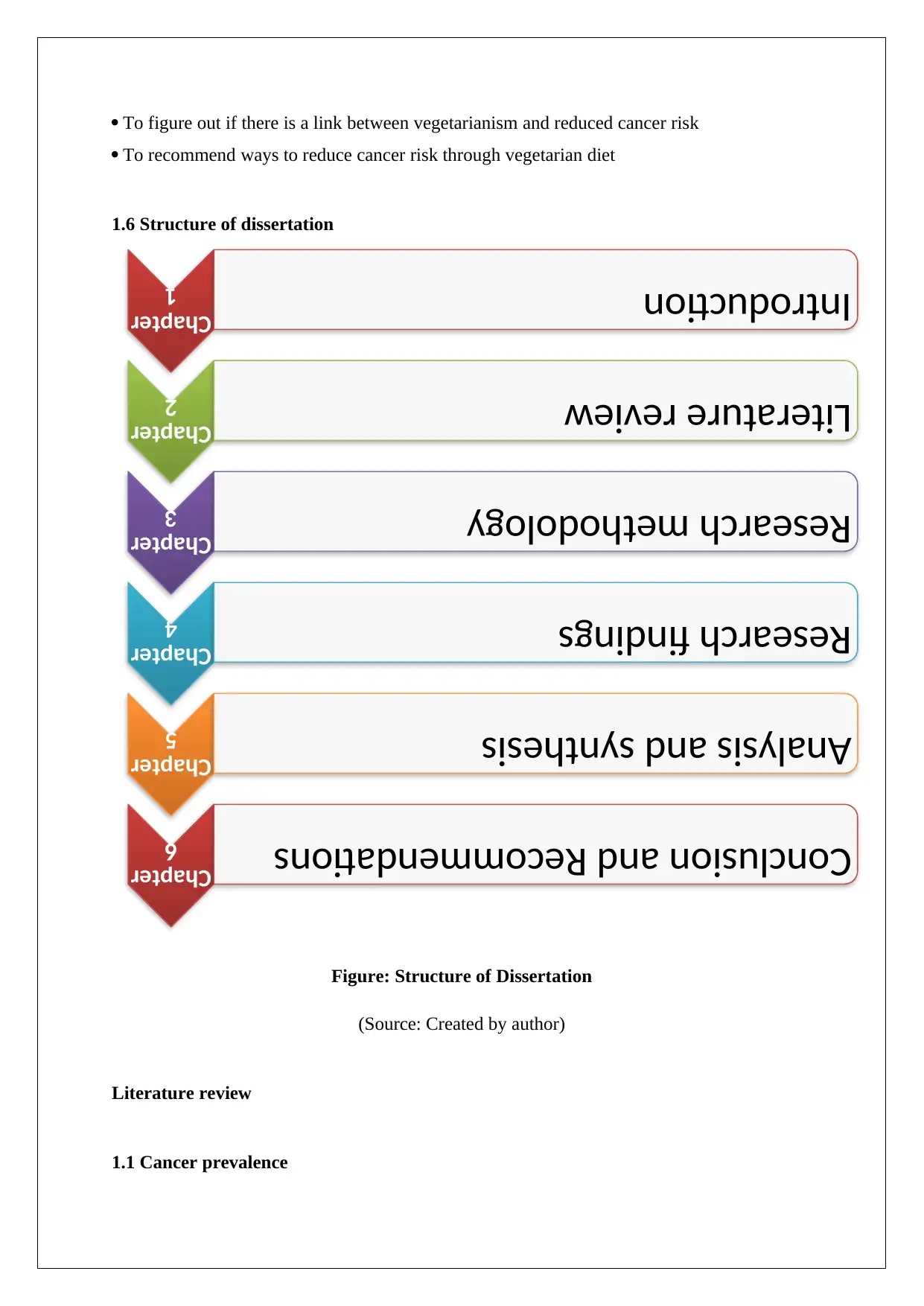
To figure out if there is a link between vegetarianism and reduced cancer risk
To recommend ways to reduce cancer risk through vegetarian diet
1.6 Structure of dissertation
Figure: Structure of Dissertation
(Source: Created by author)
Literature review
1.1 Cancer prevalence
Chapter
1Introduction
Chapter
2Literature review
Chapter
3Research methodology
Chapter
4Research findings
Chapter
5Analysis and synthesis
Chapter
6Conclusion and Recommendations
To recommend ways to reduce cancer risk through vegetarian diet
1.6 Structure of dissertation
Figure: Structure of Dissertation
(Source: Created by author)
Literature review
1.1 Cancer prevalence
Chapter
1Introduction
Chapter
2Literature review
Chapter
3Research methodology
Chapter
4Research findings
Chapter
5Analysis and synthesis
Chapter
6Conclusion and Recommendations
Paraphrase This Document
Need a fresh take? Get an instant paraphrase of this document with our AI Paraphraser
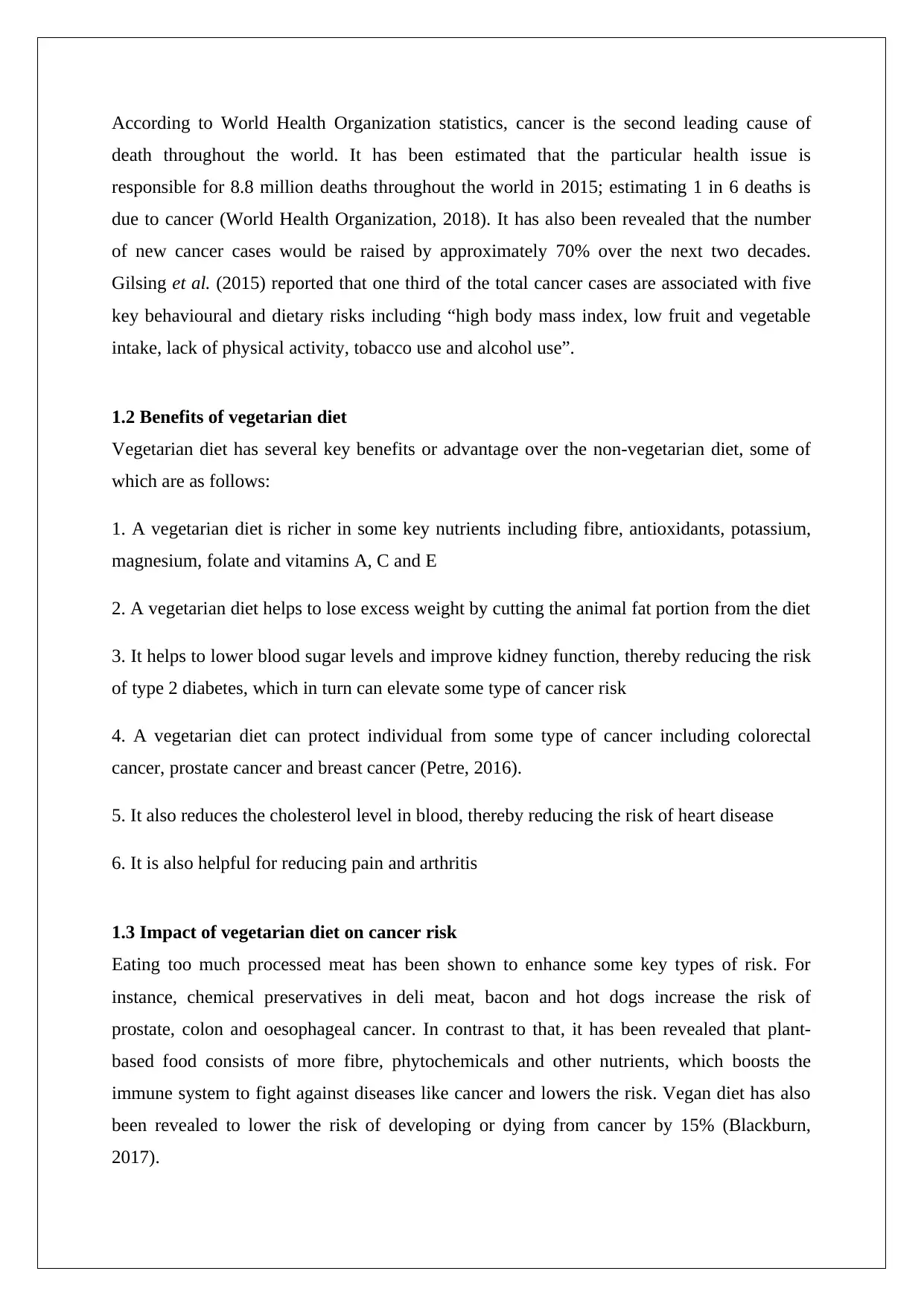
According to World Health Organization statistics, cancer is the second leading cause of
death throughout the world. It has been estimated that the particular health issue is
responsible for 8.8 million deaths throughout the world in 2015; estimating 1 in 6 deaths is
due to cancer (World Health Organization, 2018). It has also been revealed that the number
of new cancer cases would be raised by approximately 70% over the next two decades.
Gilsing et al. (2015) reported that one third of the total cancer cases are associated with five
key behavioural and dietary risks including “high body mass index, low fruit and vegetable
intake, lack of physical activity, tobacco use and alcohol use”.
1.2 Benefits of vegetarian diet
Vegetarian diet has several key benefits or advantage over the non-vegetarian diet, some of
which are as follows:
1. A vegetarian diet is richer in some key nutrients including fibre, antioxidants, potassium,
magnesium, folate and vitamins A, C and E
2. A vegetarian diet helps to lose excess weight by cutting the animal fat portion from the diet
3. It helps to lower blood sugar levels and improve kidney function, thereby reducing the risk
of type 2 diabetes, which in turn can elevate some type of cancer risk
4. A vegetarian diet can protect individual from some type of cancer including colorectal
cancer, prostate cancer and breast cancer (Petre, 2016).
5. It also reduces the cholesterol level in blood, thereby reducing the risk of heart disease
6. It is also helpful for reducing pain and arthritis
1.3 Impact of vegetarian diet on cancer risk
Eating too much processed meat has been shown to enhance some key types of risk. For
instance, chemical preservatives in deli meat, bacon and hot dogs increase the risk of
prostate, colon and oesophageal cancer. In contrast to that, it has been revealed that plant-
based food consists of more fibre, phytochemicals and other nutrients, which boosts the
immune system to fight against diseases like cancer and lowers the risk. Vegan diet has also
been revealed to lower the risk of developing or dying from cancer by 15% (Blackburn,
2017).
death throughout the world. It has been estimated that the particular health issue is
responsible for 8.8 million deaths throughout the world in 2015; estimating 1 in 6 deaths is
due to cancer (World Health Organization, 2018). It has also been revealed that the number
of new cancer cases would be raised by approximately 70% over the next two decades.
Gilsing et al. (2015) reported that one third of the total cancer cases are associated with five
key behavioural and dietary risks including “high body mass index, low fruit and vegetable
intake, lack of physical activity, tobacco use and alcohol use”.
1.2 Benefits of vegetarian diet
Vegetarian diet has several key benefits or advantage over the non-vegetarian diet, some of
which are as follows:
1. A vegetarian diet is richer in some key nutrients including fibre, antioxidants, potassium,
magnesium, folate and vitamins A, C and E
2. A vegetarian diet helps to lose excess weight by cutting the animal fat portion from the diet
3. It helps to lower blood sugar levels and improve kidney function, thereby reducing the risk
of type 2 diabetes, which in turn can elevate some type of cancer risk
4. A vegetarian diet can protect individual from some type of cancer including colorectal
cancer, prostate cancer and breast cancer (Petre, 2016).
5. It also reduces the cholesterol level in blood, thereby reducing the risk of heart disease
6. It is also helpful for reducing pain and arthritis
1.3 Impact of vegetarian diet on cancer risk
Eating too much processed meat has been shown to enhance some key types of risk. For
instance, chemical preservatives in deli meat, bacon and hot dogs increase the risk of
prostate, colon and oesophageal cancer. In contrast to that, it has been revealed that plant-
based food consists of more fibre, phytochemicals and other nutrients, which boosts the
immune system to fight against diseases like cancer and lowers the risk. Vegan diet has also
been revealed to lower the risk of developing or dying from cancer by 15% (Blackburn,
2017).
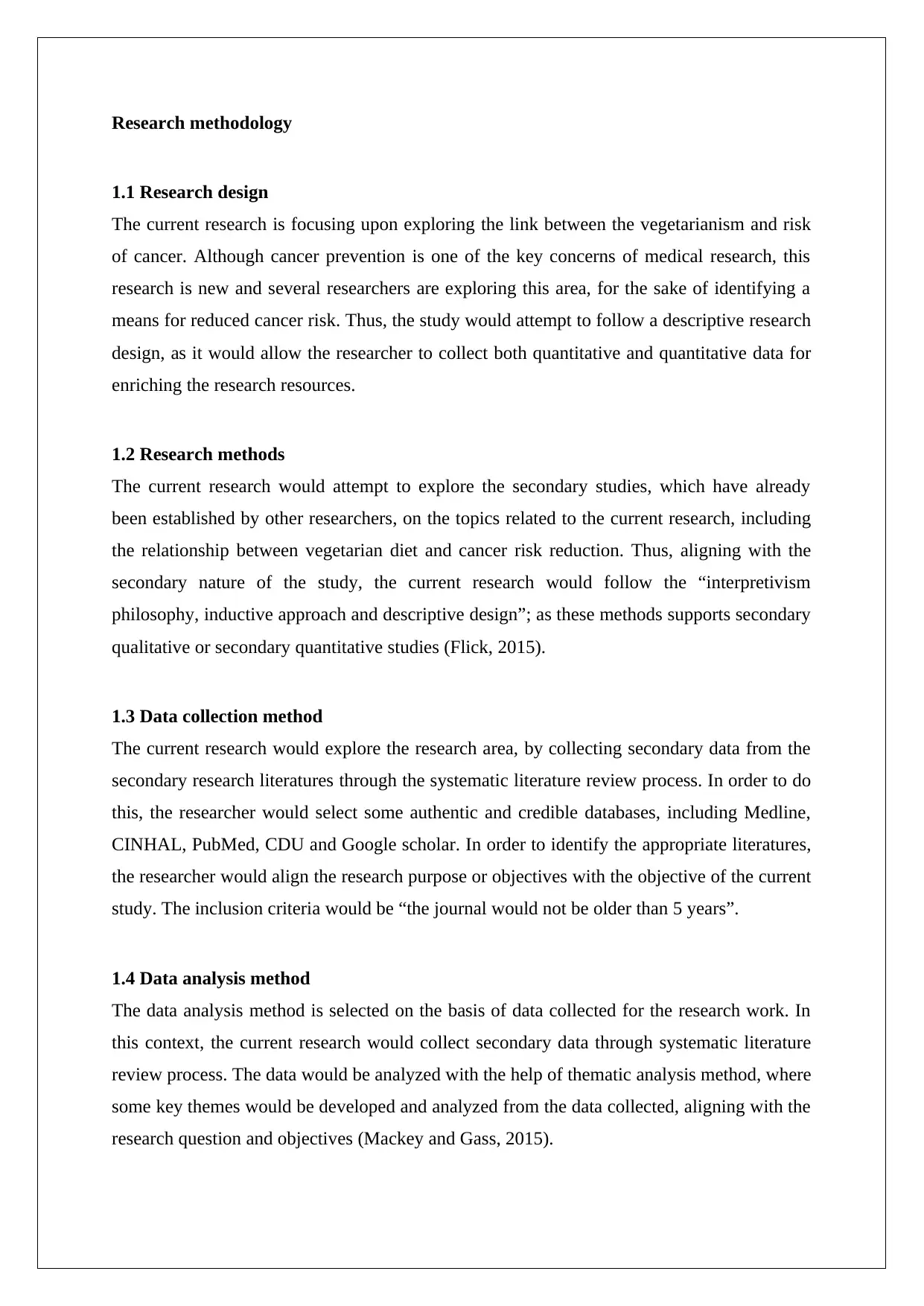
Research methodology
1.1 Research design
The current research is focusing upon exploring the link between the vegetarianism and risk
of cancer. Although cancer prevention is one of the key concerns of medical research, this
research is new and several researchers are exploring this area, for the sake of identifying a
means for reduced cancer risk. Thus, the study would attempt to follow a descriptive research
design, as it would allow the researcher to collect both quantitative and quantitative data for
enriching the research resources.
1.2 Research methods
The current research would attempt to explore the secondary studies, which have already
been established by other researchers, on the topics related to the current research, including
the relationship between vegetarian diet and cancer risk reduction. Thus, aligning with the
secondary nature of the study, the current research would follow the “interpretivism
philosophy, inductive approach and descriptive design”; as these methods supports secondary
qualitative or secondary quantitative studies (Flick, 2015).
1.3 Data collection method
The current research would explore the research area, by collecting secondary data from the
secondary research literatures through the systematic literature review process. In order to do
this, the researcher would select some authentic and credible databases, including Medline,
CINHAL, PubMed, CDU and Google scholar. In order to identify the appropriate literatures,
the researcher would align the research purpose or objectives with the objective of the current
study. The inclusion criteria would be “the journal would not be older than 5 years”.
1.4 Data analysis method
The data analysis method is selected on the basis of data collected for the research work. In
this context, the current research would collect secondary data through systematic literature
review process. The data would be analyzed with the help of thematic analysis method, where
some key themes would be developed and analyzed from the data collected, aligning with the
research question and objectives (Mackey and Gass, 2015).
1.1 Research design
The current research is focusing upon exploring the link between the vegetarianism and risk
of cancer. Although cancer prevention is one of the key concerns of medical research, this
research is new and several researchers are exploring this area, for the sake of identifying a
means for reduced cancer risk. Thus, the study would attempt to follow a descriptive research
design, as it would allow the researcher to collect both quantitative and quantitative data for
enriching the research resources.
1.2 Research methods
The current research would attempt to explore the secondary studies, which have already
been established by other researchers, on the topics related to the current research, including
the relationship between vegetarian diet and cancer risk reduction. Thus, aligning with the
secondary nature of the study, the current research would follow the “interpretivism
philosophy, inductive approach and descriptive design”; as these methods supports secondary
qualitative or secondary quantitative studies (Flick, 2015).
1.3 Data collection method
The current research would explore the research area, by collecting secondary data from the
secondary research literatures through the systematic literature review process. In order to do
this, the researcher would select some authentic and credible databases, including Medline,
CINHAL, PubMed, CDU and Google scholar. In order to identify the appropriate literatures,
the researcher would align the research purpose or objectives with the objective of the current
study. The inclusion criteria would be “the journal would not be older than 5 years”.
1.4 Data analysis method
The data analysis method is selected on the basis of data collected for the research work. In
this context, the current research would collect secondary data through systematic literature
review process. The data would be analyzed with the help of thematic analysis method, where
some key themes would be developed and analyzed from the data collected, aligning with the
research question and objectives (Mackey and Gass, 2015).
⊘ This is a preview!⊘
Do you want full access?
Subscribe today to unlock all pages.

Trusted by 1+ million students worldwide
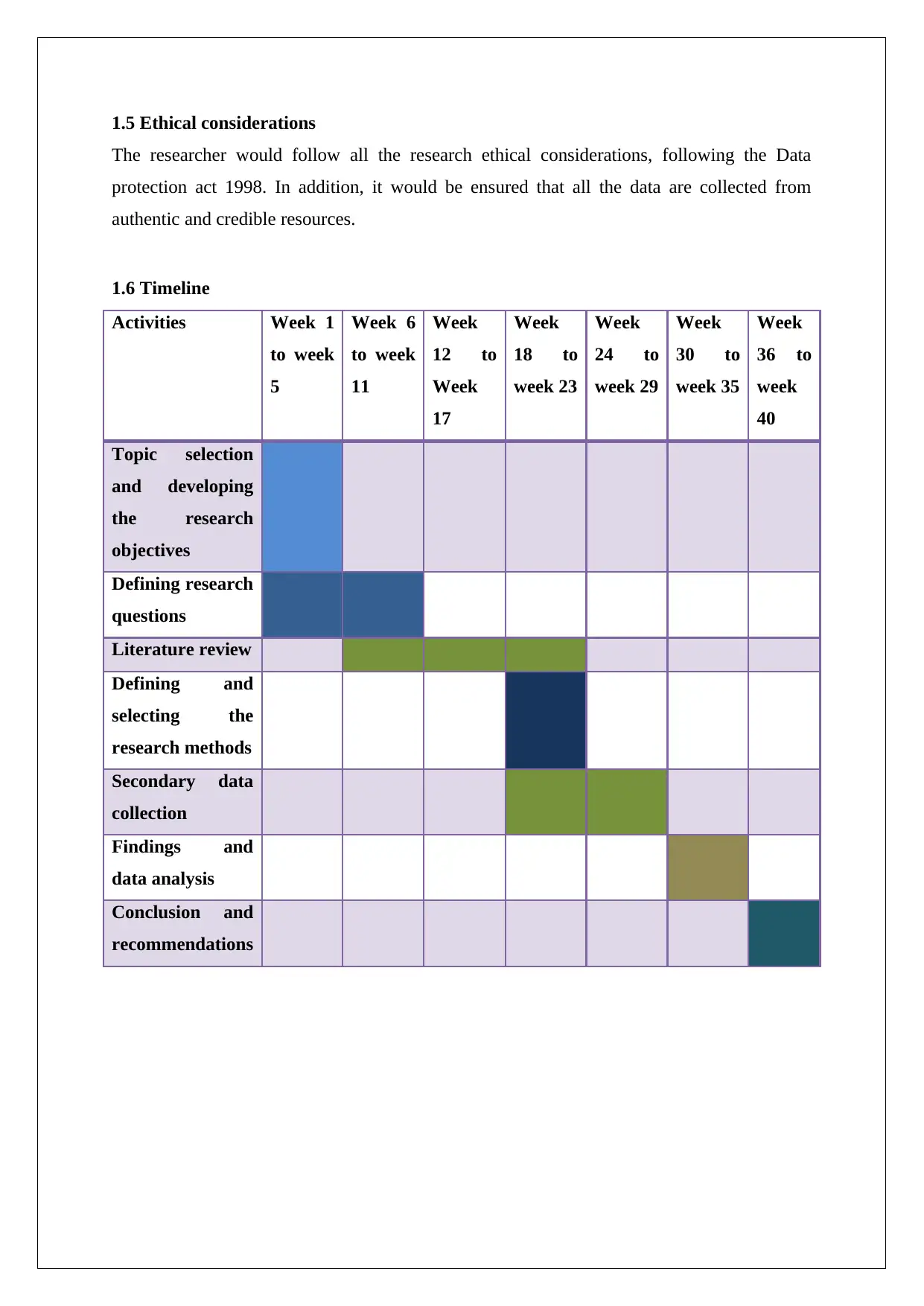
1.5 Ethical considerations
The researcher would follow all the research ethical considerations, following the Data
protection act 1998. In addition, it would be ensured that all the data are collected from
authentic and credible resources.
1.6 Timeline
Activities Week 1
to week
5
Week 6
to week
11
Week
12 to
Week
17
Week
18 to
week 23
Week
24 to
week 29
Week
30 to
week 35
Week
36 to
week
40
Topic selection
and developing
the research
objectives
Defining research
questions
Literature review
Defining and
selecting the
research methods
Secondary data
collection
Findings and
data analysis
Conclusion and
recommendations
The researcher would follow all the research ethical considerations, following the Data
protection act 1998. In addition, it would be ensured that all the data are collected from
authentic and credible resources.
1.6 Timeline
Activities Week 1
to week
5
Week 6
to week
11
Week
12 to
Week
17
Week
18 to
week 23
Week
24 to
week 29
Week
30 to
week 35
Week
36 to
week
40
Topic selection
and developing
the research
objectives
Defining research
questions
Literature review
Defining and
selecting the
research methods
Secondary data
collection
Findings and
data analysis
Conclusion and
recommendations
Paraphrase This Document
Need a fresh take? Get an instant paraphrase of this document with our AI Paraphraser
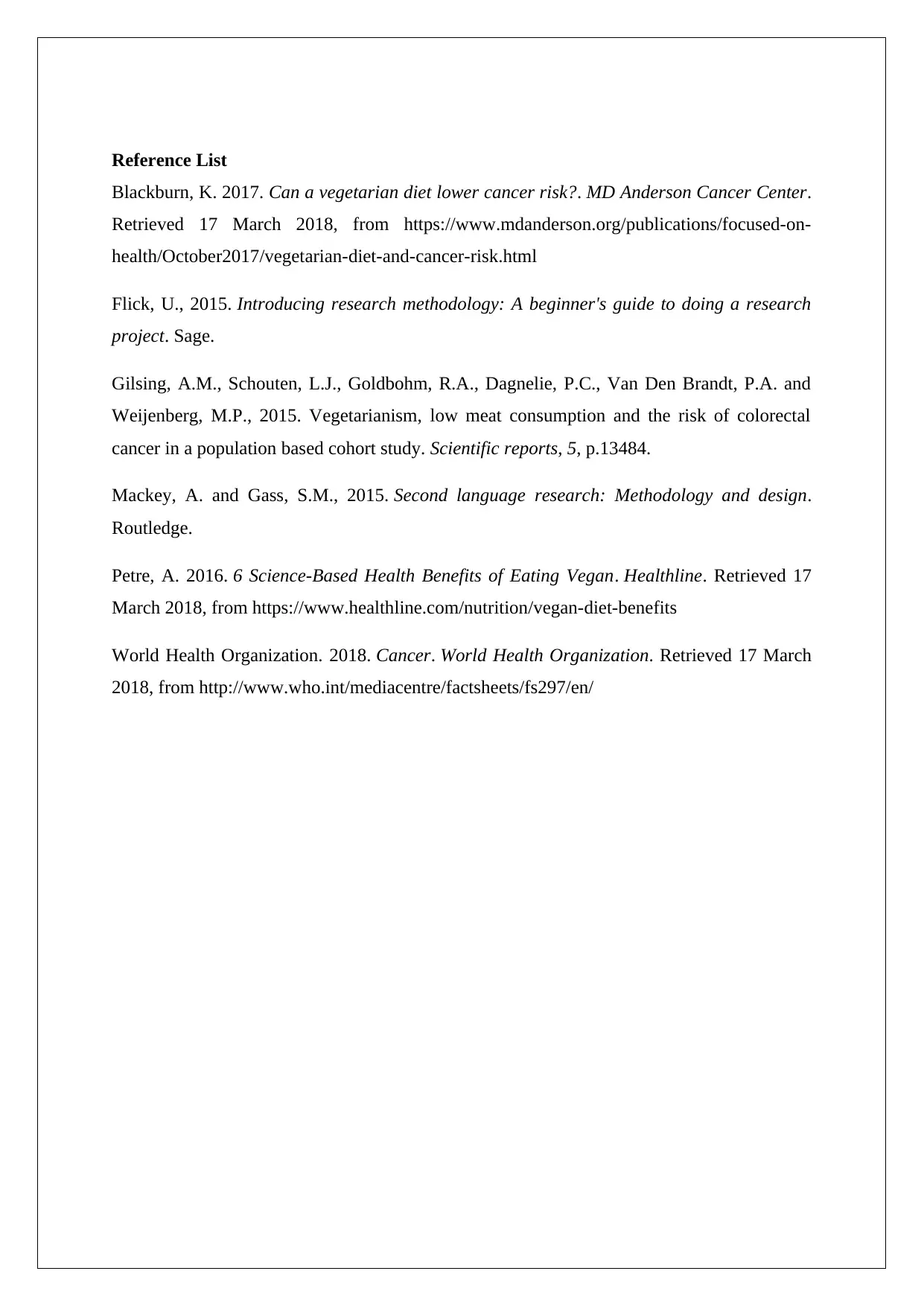
Reference List
Blackburn, K. 2017. Can a vegetarian diet lower cancer risk?. MD Anderson Cancer Center.
Retrieved 17 March 2018, from https://www.mdanderson.org/publications/focused-on-
health/October2017/vegetarian-diet-and-cancer-risk.html
Flick, U., 2015. Introducing research methodology: A beginner's guide to doing a research
project. Sage.
Gilsing, A.M., Schouten, L.J., Goldbohm, R.A., Dagnelie, P.C., Van Den Brandt, P.A. and
Weijenberg, M.P., 2015. Vegetarianism, low meat consumption and the risk of colorectal
cancer in a population based cohort study. Scientific reports, 5, p.13484.
Mackey, A. and Gass, S.M., 2015. Second language research: Methodology and design.
Routledge.
Petre, A. 2016. 6 Science-Based Health Benefits of Eating Vegan. Healthline. Retrieved 17
March 2018, from https://www.healthline.com/nutrition/vegan-diet-benefits
World Health Organization. 2018. Cancer. World Health Organization. Retrieved 17 March
2018, from http://www.who.int/mediacentre/factsheets/fs297/en/
Blackburn, K. 2017. Can a vegetarian diet lower cancer risk?. MD Anderson Cancer Center.
Retrieved 17 March 2018, from https://www.mdanderson.org/publications/focused-on-
health/October2017/vegetarian-diet-and-cancer-risk.html
Flick, U., 2015. Introducing research methodology: A beginner's guide to doing a research
project. Sage.
Gilsing, A.M., Schouten, L.J., Goldbohm, R.A., Dagnelie, P.C., Van Den Brandt, P.A. and
Weijenberg, M.P., 2015. Vegetarianism, low meat consumption and the risk of colorectal
cancer in a population based cohort study. Scientific reports, 5, p.13484.
Mackey, A. and Gass, S.M., 2015. Second language research: Methodology and design.
Routledge.
Petre, A. 2016. 6 Science-Based Health Benefits of Eating Vegan. Healthline. Retrieved 17
March 2018, from https://www.healthline.com/nutrition/vegan-diet-benefits
World Health Organization. 2018. Cancer. World Health Organization. Retrieved 17 March
2018, from http://www.who.int/mediacentre/factsheets/fs297/en/
1 out of 8
Related Documents
Your All-in-One AI-Powered Toolkit for Academic Success.
+13062052269
info@desklib.com
Available 24*7 on WhatsApp / Email
![[object Object]](/_next/static/media/star-bottom.7253800d.svg)
Unlock your academic potential
Copyright © 2020–2026 A2Z Services. All Rights Reserved. Developed and managed by ZUCOL.





